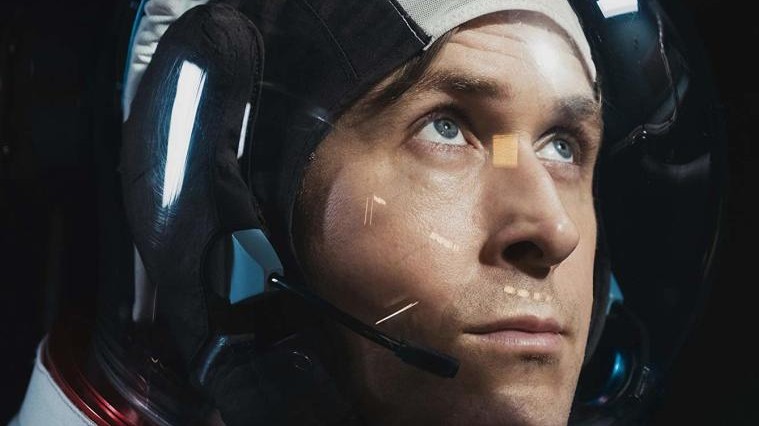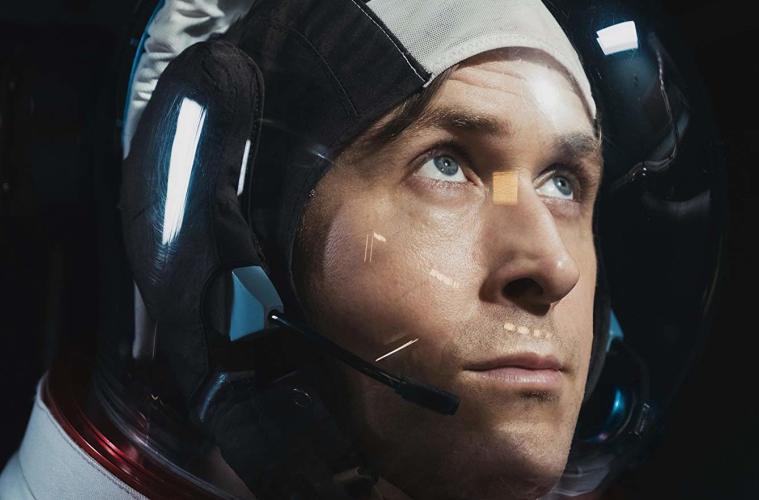“Ah, but a man’s reach should exceed his grasp, Or what’s a heaven for?” – Robert Browning
The moon, perched high in the sky, sits magisterially and quietly dignified. Like a watchful mother keeping eyes over her children that run around in the backyard of a grown-ups’ dinner party, her protecting presence observes all. In director Damien Chazelle’s eyes – and as he portrays in his latest film, First Man – this celestial entity is a shared spiritual ancestor to the first man to ever set foot on the moon, Neil Armstrong. Just as silently solemn, we see a man who was a brilliant engineer, loving father, and lonely sailor of the stars.
First Man sets out to be many things. Telling the story of the eight years prior to the famed moon landing – including early tests and unsuccessful trials that weighed heavy on all involved – it’s a wonderfully exacted and historically accurate period piece dense with action-adventure elements that are captured with stunning practical effects and visionary camerawork. However, the real survival story that Chazelle focuses on is on the ground where Armstrong navigates the tragedies of life, including the early loss of his youngest child to cancer.
This is where the film’s center is- a small character drama grounded not only by gravity but in the realities of life that surround him. It is Chazelle’s and screenwriter Josh Singer’s (Spotlight, The Post) interest and focus on this smaller side of history that characterizes Armstrong, but also what challenges the film. Armstrong is no space cowboy, but rather an engineer who thinks physics is “neat”. To this end, I wish that Chazelle and company would have gotten more swept up into the romance of the cosmos.
With ‘First Man’, [Damien Chazelle’s] third major release, he once again explores a young man’s ambitions of greatness and the things he sacrifices to get it.
As this “first man,” Ryan Gosling offers his quietly powerful persona to this real-life stoic man of few words, bringing steadfast commitment and beautiful restraint to the role. It’s the enigmatic Claire Foy as Janet Armstrong who adds the necessary pulse and life force to the film, putting those “boys” at NASA in check in moments that put her husband in danger. A fantastic supporting cast, including Kyle Chandler, Jason Clarke, Christopher Abbott, and Corey Stoll, round out the film by adding virtuoso performances.
Damien Chazelle has always been a man of ambition. With First Man, his third major release, he once again explores a young man’s ambitions of greatness and the things he sacrifices to get it. Chazelle naturally brings the cinema of life to the big screen with clear and incalculable vision. He is, after all, the youngest person ever to win the Best Director Oscar for last year’s La La Land. To this end, perhaps First Man‘s overall effect would be even more impressionable and felt if seen in IMAX. In this setting, the 16mm film transforms into IMAX during the moon sequences, which Chazelle states that was intended to be his “Wizard of Oz moment.”
At the end of the day, audiences will either cherish First Man for offering a contemplative inward journey or feel that it held itself too restrained. Overall, I would have liked to feel Armstrong be a little more awestruck, even if this was intentionally absent so as to faithfully show his brilliance as an engineer and devoted father whose still waters ran deep. Nonetheless, First Man is a brilliant work of art and dutiful historical document that no doubt furthers Chazelle’s, Gosling’s, and the rest of the creative company’s artistry, as well as adds to the story of Armstrong and those who dare to find themselves amongst the stars.
141 min. ‘First Man’ is rated PG-13 for some thematic content involving peril, and brief strong language. Now playing in theaters everywhere.
Ryan Rojas
Ryan is the editorial manager of Cinemacy, which he co-runs with his older sister, Morgan. Ryan is a member of the Hollywood Critics Association. Ryan's favorite films include 2001: A Space Odyssey, The Social Network, and The Master.


